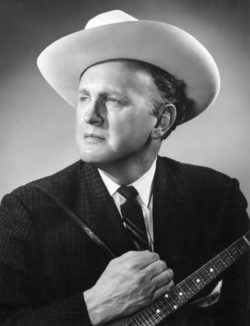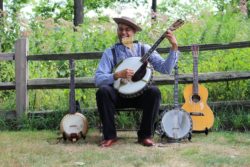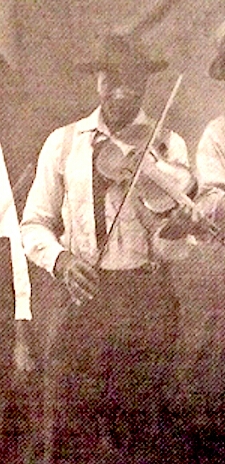From WWNC Radio To Citizen Studios: Linking Bluegrass’ Past And Present
- October 4, 2021 -
from the desk of Cassidy Ann, Citizen Vinyl Staff Producer

Bill Monroe, “The Father of Bluegrass”
Music is the passing of a cultural torch. Every genre is laced with history and precedent. Bluegrass, arguably one of the most Americana of sounds, is no exception.
At Citizen Studios, that time continuum lives on in a hallowed space that’s credited with being the jumping off point for bluegrass music, an emerging folk style in the 1930s. WWNC Radio, now Citizen Vinyl’s recording space, is where Kentuckian Bill Monroe developed the genre and broadcast it out to a live audience.
Monroe, “the father of bluegrass,” was the first credited for blending the plucks of mandolin, banjo and guitar — alongside his “high, lonesome” singing style. He performed with his gang, the Blue Grass Boys, during a regular segment on WWNC that aired in 1939. After a six-month stint at WWNC, Monroe went on to Nashville for a regular spot on the Grand Ole Opry.
“WWNC helped me get started,” Bill Monroe told the Asheville Citizen Times in 1974. “It was the first time (bluegrass) ever had a chance to be played on the radio.”
In the last decade, bluegrass music has experienced a reclamation and retelling of its genesis story. Music historians and musicians of color acknowledge while the genre was born out of the American South, it has Africa and the diaspora to thank for its emergence. The banjo, for instance, descended from plucked instruments found throughout West Africa. Musicologists have speculated that the akonting, a five-stringed lute found in Senegal, Gambia, and Guinea-Bissau, bears the most resemblance, with its skin-headed body, long neck and short fifth string.
In 2005, musicians and scholars flocked to the mountains of Boone, NC for the first Black Banjo Gathering, to recognize and honor the instrument’s African, Caribbean and Black roots.

“I don’t really think about my music in terms of old or new. My goal is to arrange songs so that they remain poignant no matter when it is released,” Dom Flemons said.
“That event set the current banjo reclamation movement into motion,” Dom Flemons, Grammy award-winning singer-songwriter and Black music historian, said in an interview with Citizen Vinyl.
Flemons says it’s accurate to consider Monroe “the father of bluegrass.” But from a genealogical framework, West Africa should be considered a distant relative.
“Bill Monroe was not without influences,” Flemons said. “The style of music innovated by Bill Monroe had a variety of sources including an old-time string band music tradition that incorporated songs of Black and white origins.”
He likens it to an old family photograph.
“A person that you see in an old photo, but no one seems to be able to identify them completely,” Flemons said. “A few people acknowledge that they recognize the person, but they don’t remember why they were there or the circumstances around the photo. Others tell a few more details, but those details still aren’t enough to give you a proper answer.”
There’s one particular ancestor that could be considered “the godfather” in that blurry family photo. Arnold Shultz was a well-known Black fiddler and guitar picker in Western Kentucky. The son of a freed slave was considered a virtuoso. Shultz was celebrated for his unique style that also introduced jazz chords and lead guitar flat picking to the string band community.
“When most old time fiddle tunes use little to no chord changes at all, Shultz’s innovations changed the dynamics of the region’s string band music,” Flemons said.

Fiddler and guitarist Arnold Schultz was credited with teaching Bill Monroe. (credit: Wikimedia Commons)
When Shultz wasn’t working in the coal mines, he was strumming and breakdown fiddling at barn dances and community picnics in the 1920s. He also taught musicians, including Bill Monroe and his brother and bandmate, Charlie Monroe. Jazz solos emerged in Monroe and the Blue Grass Boys’ recordings. In his later years, Bill Monroe acknowledged Shultz’ influence on his technique, which brings up the question of ownership.
“In the segregated South, there were not many opportunities for African-American music to make its way into the mainstream. The development of bluegrass and its incorporation of jazz elements is a standing testament to the power of Black music at that time,” Flemons said. “Even though it could not be openly acknowledged in other social situations, the music tells a fascinating and compelling story of musical exchange between white and Black people of Kentucky.”
Shultz’s music was never recorded. He died when he was 45, allegedly of alcohol poisoning. Some say he was murdered by musicians jealous of his ability. His lesser-known story speaks to the erasure of African-American contributions throughout Southern culture and heritage. The present-day movement to credit his — and many others’ — legacy is part of a broader effort to decolonize bluegrass music. To make it more reflective and accessible to artists of color.
“It’s a very different perspective from my own experience,” Flemons said. “I’ve always tried to create awareness through music, but I’ve always kept my music rooted in tradition, so that I could make it sound both historic and modern at the same time.”
The convergence of the historic and the modern continues to play out in the former WWNC Radio studio. More than 80 years later, Citizen Studios is where new sounds are created and preserved for listeners today and tomorrow. The work to acknowledge and honor the voices that weren’t given a space to record continues. Past remains present.



